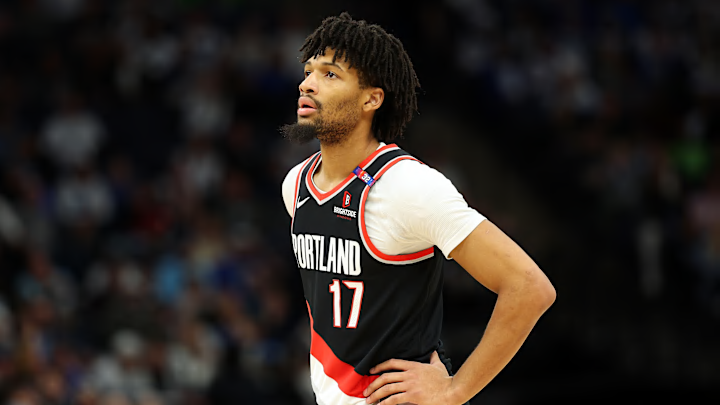Now in his third year, Portland Trail Blazers guard Shaedon Sharpe is having the most productive season of his young career. He's averaging a career-high 17.1 points, along with 3.8 rebounds and 2.5 assists on 44/31/80 shooting splits.
At just 21 years old, Sharpe already has a polished offensive skillset. He utilizes his elite athleticism to get downhill or create space for his lethal midrange jumper. Beyond scoring, he's also an underrated playmaker, good at drawing help defenders to create opportunities for teammates.
Given those traits, you could make a strong case for Sharpe being the most likely Blazer to develop into an All-Star. But despite his upside and being a key piece of their rebuild, Portland hasn't prioritized their former No. 7 pick -- especially in recent weeks.
After their January 18 loss to the Houston Rockets, Chauncey Billups decided to demote Sharpe to a bench role. When fully healthy, Portland has instead been rolling out a lineup of Anfernee Simons, Toumani Camara, Deni Avdija, Jerami Grant, and Deandre Ayton. We hoped Sharpe would finally get his starting spot back in their recent loss to Denver with Grant (knee) and Scoot Henderson (ankle) out due to injuries. But Billups opted for Kris Murray instead.
Shaedon Sharpe's benching paid off, but at what cost?
They've had some relative success with jumbo lineups and may have found a formula they needed to use during the Damian Lillard era -- surround an undersized, offensive-minded guard (Simons) with three wings who all have good positional size and can guard multiple positions to compensate defensively.
That lineup combination contributed to the Blazers' hot stretch, where they won 10 of 11 games, with their only loss coming to the Oklahoma City Thunder. During that stretch, the Blazers ranked among the league's best in defensive rating.
Sharpe's defense was the primary reason Billups benched him in the first place, and it's hard to argue with the results. But the Blazers aren't ready to make a playoff push and should be patient in their rebuild, prioritizing their young core and long-term outlook over wins.
The impact of Shaedon Sharpe’s benching
Has the benching impacted Sharpe? Here are his numbers before and after:
Shaedon Sharpe prior to benching | Shaedon Sharpe since benching | |
|---|---|---|
G | 32 | 14 |
MP | 32.5 | 26.9 |
FGA | 15.5 | 12.9 |
FG% | 45.1 | 42.0 |
3PA | 6.4 | 5.9 |
3P% | 31.2 | 30.1 |
FTA | 3.3 | 2.9 |
FT% | 80.0 | 80.5 |
REB | 4.0 | 3.6 |
AST | 2.8 | 1.9 |
STL | 0.9 | 0.8 |
BLK | 0.3 | 0.1 |
TOV | 2.0 | 1.6 |
PTS | 18.6 | 15.0 |
Sharpe's numbers have taken a dip in every category outside of free throw percentage and turnovers, which makes sense considering he's playing 5.6 fewer minutes a game.
Before the season, a mutual parting between the Blazers and Billups seemed inevitable. Whether that's still the case remains to be seen. But Billups appears to be coaching as if he's auditioning for his next job -- focusing on winning instead of prioritizing the team's long-term development.
It's understandable that Billups is making decisions to win now. But that's exactly why GM Joe Cronin needed to make a trade or two at the deadline, to take away Billups' ability to prioritize veterans over the team's young core.
Not to mention, Simons has a worse defensive rating (120.6) than Sharpe (119.2), while Grant isn't too far behind at 118.8. And then there's Deandre Ayton -- how often have we seen his minutes limited due to a lack of effort, only for him to return to his usual role in the next game? I'm all for accountability, but I'm not sure the same level of accountability applies to the Blazers' veterans.
Time will tell how this plays out, but it's something to monitor post-All-Star break. It's an unnecessary risk to take as it could frustrate Sharpe and make him less inclined to stay in Portland long-term. But hopefully, it will go as Billups envisioned, and Sharpe will be more motivated to become a two-way player, unlocking his All-Star potential as a result.
